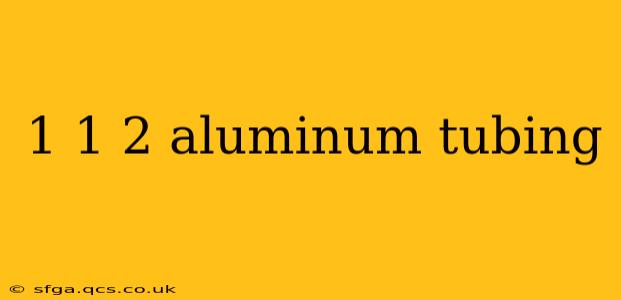Aluminum tubing, specifically 1 1/2" diameter tubing, finds widespread use in diverse applications due to its lightweight yet sturdy nature, excellent corrosion resistance, and impressive thermal conductivity. This guide delves into the specifics of 1 1/2" aluminum tubing, exploring its properties, common applications, and factors to consider when selecting it for your project.
What are the different types of 1 1/2" aluminum tubing?
Several factors differentiate 1 1/2" aluminum tubing, impacting its suitability for specific applications. These include:
-
Alloy: Aluminum alloys, such as 6061, 6063, and 5052, possess varying strengths, workability, and corrosion resistance. 6061 is a popular choice for its strength and weldability, while 6063 is often preferred for its extrudability, making it suitable for complex shapes. 5052 offers superior corrosion resistance. The choice of alloy depends heavily on the intended use.
-
Wall Thickness: Tubing wall thickness significantly affects its structural integrity and weight. Thicker walls provide greater strength and durability, but also increase weight. Thinner walls are lighter but may be less robust. The required wall thickness is determined by the application's stress requirements.
-
Surface Finish: Aluminum tubing can have various surface finishes, including mill finish (as-extruded), anodized, or powder-coated. Anodizing provides enhanced corrosion resistance and a decorative finish, while powder coating adds further protection and aesthetic appeal.
-
Length and Cut: Tubing is available in standard lengths, but custom cuts are often available from suppliers. Knowing the precise length needed will help optimize material usage and reduce waste.
What is 1 1/2" aluminum tubing used for?
The versatility of 1 1/2" aluminum tubing makes it suitable for a broad spectrum of applications, including:
-
Structural Frameworks: Its lightweight strength makes it ideal for building lightweight yet durable structures in various industries, from aerospace to automotive.
-
Handrails and Guardrails: Its corrosion resistance and attractive appearance make it a popular choice for handrails and guardrails in both indoor and outdoor settings.
-
Furniture Manufacturing: Aluminum tubing is frequently used in furniture construction, contributing to lightweight, modern designs.
-
Conveying Systems: Its lightweight nature and ability to be easily formed make it suitable for components in conveying systems.
-
Automotive and Aerospace: Its strength-to-weight ratio is highly valued in these industries, where weight reduction is critical.
Where can I buy 1 1/2" aluminum tubing?
1 1/2" aluminum tubing is widely available from various suppliers, including online retailers, metal supply stores, and specialized aluminum distributors. When sourcing, consider factors such as price, availability, and the supplier's reputation.
What is the price of 1 1/2" aluminum tubing?
The price of 1 1/2" aluminum tubing varies significantly based on several factors, including the alloy used, wall thickness, surface finish, length, and quantity ordered. It's best to contact suppliers directly for accurate pricing information.
How strong is 1 1/2" aluminum tubing?
The strength of 1 1/2" aluminum tubing is largely dependent on the alloy and wall thickness. Thicker-walled tubing made from stronger alloys (like 6061) will naturally be stronger than thinner-walled tubing made from less robust alloys. Consult material datasheets for specific strength values for a given alloy and wall thickness.
What are the dimensions of 1 1/2" aluminum tubing?
The "1 1/2"" refers to the outside diameter of the tubing. The inside diameter and wall thickness will vary depending on the specific tubing specifications. These dimensions are crucial for ensuring proper fit and function within your project. Always check the supplier's specifications before ordering.
This guide provides a comprehensive overview of 1 1/2" aluminum tubing. Remember to carefully consider the specific requirements of your project when selecting the appropriate alloy, wall thickness, and surface finish to ensure optimal performance and longevity. Always consult with a professional engineer for critical applications requiring detailed structural analysis.
